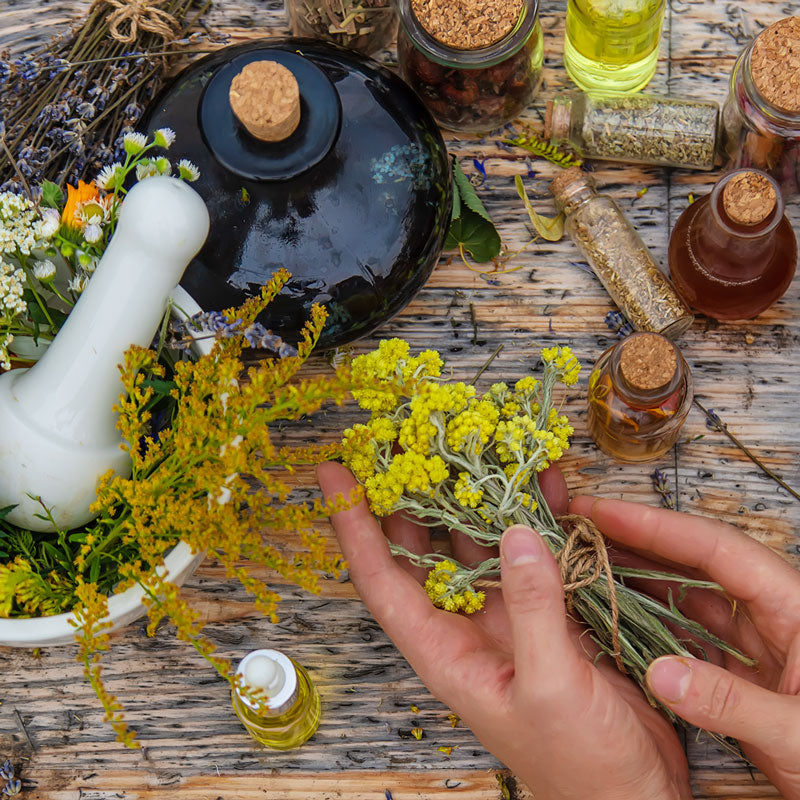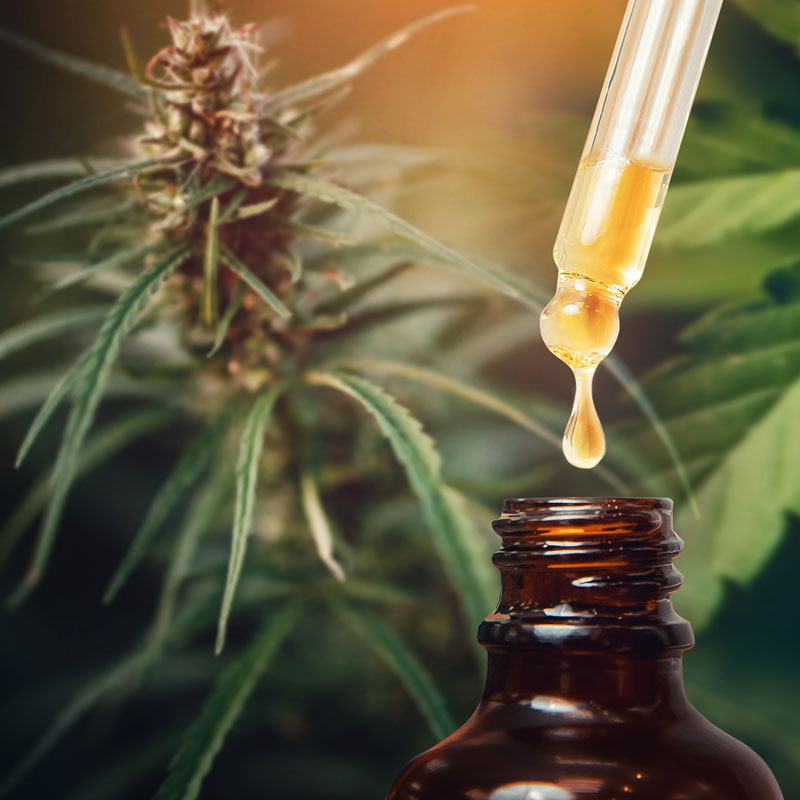How to Make Cannabis Concentrate From 200 Proof Alcohol Tincture
What is cannabis concentrate?
Cannabis concentrate refers to any form of cannabis in which all plant matter has been removed, leaving behind an isolated concentration of cannabinoids. These concentrates can vary widely in texture and consistency, ranging from tar-like resin to honey-like oil to hard, candy-like shards.
Popular examples of cannabis concentrates include kief, RSO, shatter, budder, resin, pressed rosin, distillate, tinctures, and even isolated crystals of pure cannabinoids.
Different methods to evaporate - Which is best?
There are a number of different ways to evaporate away the ethanol from your tincture. Ethanol will naturally evaporate out of solution if left unattended for a long enough period. By changing the variables of temperature, air flow, or air pressure (think vacuum) the speed of evaporation of the ethanol can be greatly increased. Modifying the variables listed can be done independently, or in cooperation, and doing so however incorporates tradeoffs that should be considered.
Is heat required to evaporate alcohol from tincture?
Ethanol does not require heat to evaporate out of solution. If adding heat to the system, the speed of evaporation will be significantly increased, however issues of safety as well as the necessity to closely monitor the progress of the evaporation are introduced. Applying too much heat to the tincture can decarboxylate and then scald/burn the evaporated concentrate producing an unusable burnt final concentrate. Also, there are safety concerns with combining heat sources and ethanol vapors. One should never mix sources of heat and ethanol vapors without strongly considering the safety of the overall system, paying special attention to flame risks and adequate ventilation of the fumes/vapors created.
Is a vacuum required to evaporate alcohol from tinctures?
No, ethyl alcohol will evaporate at normal atmospheric pressure. Changing the air pressure of a closed system containing an ethanol tincture will lower the temperature at which the ethanol will naturally evaporate (the boiling point of the liquid). This can have the benefit of increasing the speed of evaporation while eliminating the safety concerns introduced by a heat source, as well as reducing the possibilities of burning/scalding a batch of concentrate as it nears completion. However, creating a sustained vacuum can be an expensive endeavor requiring specialized equipment designed for that sole purpose. Vacuum ovens and vacuum pumps require regular maintenance, have a high up front cost, and consume vacuum oil as part of their normal operation.
Incentivizing Evaporation of Alcohol Naturally (Without heat or vacuum)
Increasing air flow however has the benefits of increasing the speed of natural evaporation, without requiring special equipment, and without introducing the safety concerns presented with adding a heat source. Of all of the potential methods presented to increase the speed of the evaporation of the tincture, increasing the air flow is the method that we recommend based on the being the safest method. Also, because no heat is introduced to the system, there is zero risk of the final concentrate being ruined/burned/or over decarboxylated. Finally, increased air flow systems do not require any special equipment, materials, consumable oils (like vacuum pumps), and require no supervision while the evaporation is occurring.

Methods of Reducing Alcohol Content in you Tincture.
To make RSO, you must remove the alcohol from the tincture, while also leaving behind the cannabinoids which will form a think sticky oil like concentrate. There are a number of different methods that can be used to reduce the alcohol present in a tincture, each with it's own pros, cons, advantages, disadvantages, draw backs, caveats, and warnings. Read the descriptions of the different methods below and choose the right method for your given situation and surroundings. Always use extreme care and caution when combining a heat source with flammable vapors.
Crock Pot / Rice Cooker.
A common countertop crockpot or rice cooker can be used to indirectly heat the tincture containing liquid, whereby the added heat can dramatically increase the rate of evaporation.
Warnings: Never use indoors.
Stove Top / Double boiler
This setup places tincture in a separate bowl over a pot of boiling water, whereby the heat is transferred to the tincture indirectly by contact with the layer of steam only. This gentle heating method is favored by chefs for control-warming delicate ingredients like chocolate. While the heat applied is indirect, double boiler setups are always setup indoors and over a direct heat source which still introduces concern for safety. Fume ventilation during double boiler evaporation must also be taken into account.
Pros: Cheap and easy to setup with pots and metal bowels you already have, slow and controlled application of heat via indirect steam.
Cons: Fume and fire hazard with indoor operation. Spill risk. Strong, lingering odor.
Warnings: Flame and fume hazards.
Electric Hot Plate
Available in many sizes, the power output is generally proportional to the surface area of warming surface offered. Hot plates come in a variety of strengths including mug warmers, all the way up to stove-top burner equivalents. Hot plates can quickly increase the temperature of a liquid, and without a careful eye can burn or scorch the reduced concentrate leading to over-decarboxylation. Quickly evaporating alcohol tincture can also create fumes that must be properly vented away from people or sources of ignition.
Pros: Low power reduces risk of over decarboxylated final concentrate. No standard model.
Cons: Requires electricity, creates fumes and vapors that must be contained and vented properly. Risk of over-decarboxylation.
Warnings: Hot plates can apply too much heat, and too quickly, and should not be used for reducing alcohol tincture into RSO.
"Cold" Forced Air Flow Evaporation
You might already know this but left alone for enough time and 200 proof alcohol will naturally evaporate away. When it evaporates away, it leaves behind any dissolved oils, waxes, and other constituents that were extracted during the tincture making step. Natural cold air evaporation is slow, however the rate of natural evaporation can be maximized by introducing lots of fresh air to the party.
Cons: Slow. Expect 8fl oz of alcohol tincture made with 200 proof ethanol to take 24-48 hours to fully evaporate under room temperature forced airflow.
Counter-Top Home Water Distiller
These devices are designed for distilling water, not 200 proof ethanol, and especially not flammable liquids. Never use a water distiller to reduce the alcohol in your alcohol tincture.
RSO Devices - Magic Butter Machine, The Source Turbo, others.
These devices work, they work well, and they each have their own audience and followers. We've heard many customers ask if Culinary Solvent works in their Magic Butter Machine or Source Turbo and the answer is "Yes". If you have experience tincturing and extracting with 190 proof Everclear, you will notice the difference in extraction and reclaim rate made possible with 200 proof ethanol.
The DIY Route, Build Your Own AVA.
- Set and Forget: there is no "over done" or "ruined batches" because it went too long and added too much heat. AVA does not use heat, there is no too done and risk of running dry unattended, it's just a box fan!
- AVA can do large batches (2 gallons of tincture) or small batches (1 fl oz or smaller, technically).
- Subsequent batches of tincture can be added on top of each other maximizing total flow through volume further increasing output capability.
- AVA finishes a batch to done, not some goopy stage that requires more processing. Total Alcohol contained in dry shard samples have been tested below 0.5% residual alcohol.
- Cons of AVA: The alcohol vanishes, as in goes away, not reclaimed, lost forever.
- AVA takes a long time to run a batch, longer than other systems out there. To evaporate 1 gallon of 200 proof cannabis tincture will take approximately 100 hours of operation. This 100hours is 100% unattended wholly autonomous and running quietly in the background while you continue on with your day. 100 hours is 4 days + 6 hours, so if you start a batch evaporating Friday evening at 8PM, your concentrate should by dry and ready by Wednesday morning.
- Make a large volume of cannabis tincture, 97% of the volume at hand will evaporate away. To illustrate reduction, 1 gallon of tincture might yield between 12 and 30 grams of concentrate depending on starting material quality. 8 fl oz of the same tincture might yield 0.75g-1.5g of final concentrate and may be too small for this process...
- Evaporate away the alcohol, leaving behind a concentrated oil containing the cannabinoids extracted in the tincture step.









